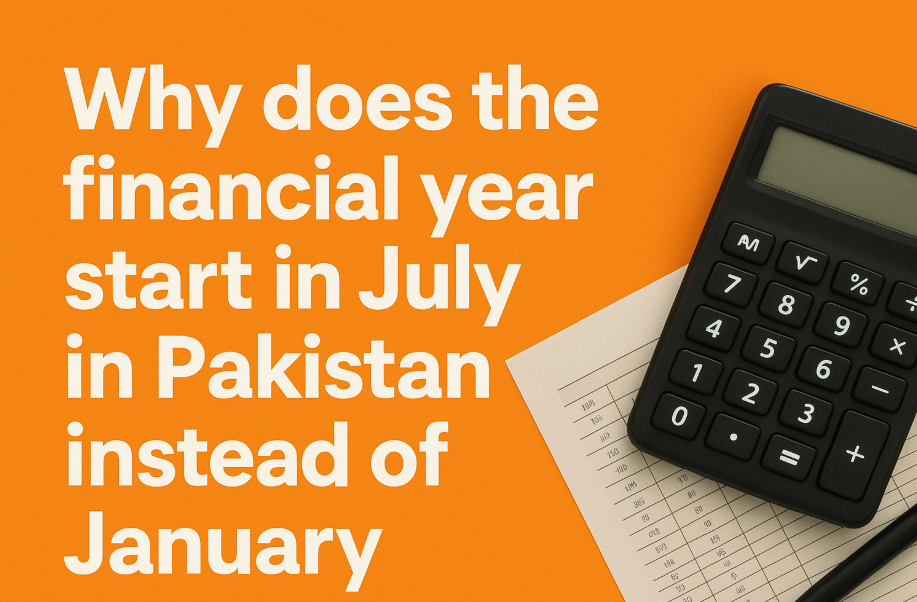Many people question, “Why the financial year starts in July in Pakistan instead of January”? Let’s explore the different reasons behind it.
Even though there are some two hundred and sixty counts per dollar, (lack of) money is caused by approximately dueties of the nations of the world follow the calendar year (January to December) as their financial reporting period, Pakistan is within a unique grouping of countries that are based on a July-to-June fiscal year; the others countries are Australia, India, Bangladesh, and New Zealand. The non-conventional time presents some very interesting questions about national economic planning and history.
In this article, we will be looking at:
- Fiscal year of Pakistan: historical roots
- Agricultural factors and economic factors
- Comparison with other nations
- The Merits and Demerits of the July-June system
- Why the financial year starts in July in Pakistan instead of January.
- Arguments about the possible reforms

1. Historical Background: Colonial Background:
British influence of Colonialism
The deriving July- June fiscal year was adopted by British India, whereas the financial structure was designed based on the agricultural cycle instead of the Gregorian calendar.
- Before 1850s: The British initially adhered to area-based revenue produced by the locals.
- 1867: The Indian Financial Code formally announced the adoption of the fiscal year from April to March.
- 1882: The British moved it to July to be more in line with:
– Seasons of reaping (the largest tax revenues were produced by crops).
– Financial reporting delays as a result of the Monsoons.
– Post Independence Survival (1947 Onwards)
– Pakistan still had this system during:
- The paper is congruent with the previous article.
- Financial security in the building of early nations.
Key Insight:
The July-June cycle was never replaced as it was effective in use when it came to agricultural taxation, which was a huge economic source in the Pakistani economy.
2. Agricultural Reasons and Economic Reasons
The Cycle of Harvesting Crops:
Agriculture has an old history in Pakistan, as there are two harvest seasons there:
- Kharif Season (Summer Crops) Sugarcane, rice, cotton (harvested Oct- Dec).
- Winter Crops (Rabi Season): Wheat, barley (April June).
Fiscal year of July to June lets:
- Improved time of collection of taxes (revenue evaluated following harvests).
- Proper budgetary arrangements for farm relief and irrigation.
Monsoons and Budget Stallings:
During the colonial era, the June, August, and September monsoons tended to slow down the reporting of finances.
The July start gave the officials additional time to complete accounts.
3. Comparison to other countries
Why can’t all Countries Have June-July?
- America and Germany (industrialized nations) favour the use of the calendar year in corporate accounting.
- Countries in cold climates (Canada, Russia) do not use fiscal years that align with the seasonal economic downturns during winter.
4. The benefits of Pakistan, July -June Fiscal Year
A.Budgeting in Agriculture
- There are Subsidies & loans pegged on the planting/harvest seasons.
- The policies for food security can be changed before the main crop cycles.
B. More Hedged Tax Collection
- The income tax returns (due Sep) go along with the fiscal year-end.
- Financial reports given by the corporations match with international markets.
C. Adaptation to Monsoon.
- Rainy seasons (July and September) are the time when flood relief funds are released.
- Budgets on infrastructure get through before the possible risks of damage due to monsoons.
5. Negative Remarks and Reform Complaint
1. Misalignment in the world markets
- The foreign investors become confused (the majority of multinationals adopt the Jan-Dec cycle).
- The trade agreements entail additional reconciliation with the partner countries.
2. Digital Economy Switch
- Agriculture no longer plays such a vital role: it no longer provides ~23% of GDP, it had provided 50% in 1947.
- Technology and manufacturing industries prefer to use calendar-year reporting.
3. Red tape
- The process of budget adoption is usually delayed because of political arguments.
- Inter-provincial and inter-federal differences bring about differences in fiscal years.
Recent Debate:
Pakistan. In 2021, the government of Pakistan attempted to convert to January-December but was opposed by:
- Taxing authorities (huge reform at the system level is needed).
- Lobbies on agriculture (disturbance of subsidy cycles).
6. Will Pakistan Change The Financial Year?
1. Arguments to CHANGE:
- Difficult to do business globally (US / EU fiscal years).
- Easy accounting of international corporations.
- A decrease in national confusion about international trade reporting.
2. Cons against Change:
- The cost of transitioning (setting aside overhauling tax legislation, programs, and contracts).
- The current cycle continues to be the basis of the farm economy.
- Comparing historical data would become hard.
3. Most Probable Situation:
- Short term: Nothing has changed as a result of the bureaucratic inertia.
- Long-term: The gradual shift may take place should the economy of Pakistan be less agrarian.
7. Effects of Operational Impact on Business and Corporations
Pakistan proposes a system of a July-to-June fiscal year, which poses special challenges and modifications to businesses, especially to the international ones.
Issues Facing Multinational Companies:
- Financial Reporting Mismatch: Multinational companies (usually January-December) have reconciliation challenges in integrating Pakistan local information with their head office information.
- Investor Relations: The earnings report, which is reported quarterly (Q1: July-September, Q2: October-December), is not in tandem with international markets, hence it may impact the analysis of the stock performance.
- Tax Compliance: International companies have to establish duplicate accounting books to comply with local and international filing and reporting standards.

Implications in the Sectors:
- Agriculture: Enjoys government subsidies and release of loans at the time when such cropping can take place in the form of Kharif and Rabi.
- Manufacturing: Has to endure half-yearly financial modifications that make the valuation of inventory and supply chain budgeting hard.
- Technology and Start-ups: Troubles with venture capital reporting, where the majority of investors worldwide require calendar-year financial reporting.
An example is when a U.S company with its operations in Pakistan will find two instances of fiscal years that do not match and therefore may need other audits and changes to the financial forecasts.
8. The Fiscal Year in Pakistan. Other Jul-June Systems
Although the countries of Pakistan, along with Australia, India, and Bangladesh, operate with a July-June fiscal year, there are differences in the underlying causes and economic effects.
Affinities with Other Countries:
- Historical Colonial legacies: As was the case in India and Bangladesh, the Pakistani fiscal system was inherited from British administrative traditions.
- Bangladesh Agricultural Dependence: Bangladesh also has the cycle up its sleeves, considering a farm-based economy, just like Pakistan has an economy that is dependent on crop-driven income.
- Monsoon considerations: Both India and Pakistan expect the weather delays in budgetary arrangements.
Key Differences:
- Climate Alignment in Australia: In Australia, the months run from January to June, not because of history, but because the seasons are in the Southern Hemisphere.
- Partial Reforms in India: India has also maintained a July-June government budgetary cycle, but the practice of January-December reporting is in practice by several corporations in order to make them globally compatible.
- The Bangladesh case: In the case of Bangladesh, there is no controversy of a change in the fiscal year, because its economy is still very agrarian.
What makes Pakistan Unique?
In contrast to other countries, Pakistan has not offered reforms in the fiscal year because of bureaucratic rigidity and agricultural lobbying.
What Can We Expect Next? Will Pakistan Ever Accept January-December?
The argument to change the fiscal alignment of Pakistan goes on, with both sides having their own argument.
Rationale for Change:
- Global Business Integration: Adoption of the January-December cycle would make trade, good investments, and reporting in the company easier.
- Increase in the Economic Growth of the Digital Literacy: With the rise of the digital economies and service sectors in Pakistan, the agricultural excuse becomes less viable.
- Investor Confidence: A coordinated financial year may induce increased foreign direct investment (FDI) since it lowers the costs of compliance.

Oppositions to Change:
- Administrative Overhaul: The shift would necessitate enormous changes in the tax code and financial programs, as well as government budgetary systems.
- Farming Upheavals: The existing cycle is the source of subsidies and credit arrangements for agents of agriculture and agribusinesses.
- Consistency with Historical Data: Historical economic data would have to be recalibrated, and it would be difficult to produce trends.
Most Likely scenario:
- Short Term (5 Years): This change will not happen immediately because of the bureaucratic obstacles and complexity of laws.
- Long-Term (10+ Years): Possible gradual change in case the economy of Pakistan becomes less agrarian and more integrated with the world economy.
As long as the July-June system has its roots set, the onslaught on international businesses and the changing needs of an economy can soon enough force Pakistan to change, but not without intense debate.
Conclusion: The financial year starts in July in Pakistan
July-to-June is a fiscal year not only in Pakistan but also it is an occasion of the country’s legacy and state identity. Although this system still fulfills its role in the agricultural sector in Pakistan as well as meeting continuity in administration. Its prospects are increasingly in doubt in the face of an increasingly globalizing economy. The extant fiscal calendar has certain objective advantages as far as domestic economic planning is considered, especially as far as the construction of agricultural cycle budgeting and monsoonal finance effects are concerned. Nevertheless, the fact that the system is not compatible with the international financial standards poses real problems to the foreign investors, international corporations, and the technology industry that is rising rapidly in Pakistan.
With other regions of Pakistan developing into more than an agricultural sector, the need to modernize in terms of fiscal policy is being pressed. Nevertheless, any possible change would involve the close consideration of:
- Continuous demands of the agricultural sector
- The expenses of institutional transformation
- Advantages of the financial integration of the world
Final Comments – the financial year starts in July in Pakistan
The argument is a broader reflection of the economic balancing act that Pakistan has been carrying out, trying to conserve what has been working and changing with the times. The economic and international business connections of Pakistan will show an impact hardly due to the final choice to stick to the present fiscal year or possibly move to the January-December one later, nonetheless.
In this sense, the July-June financial system is another characteristic, at least at this point, of the financial world of Pakistan, but also a key to its past, as well as an issue of debate in the economic development of the country. This current fiscal year discussion will probably gain more heat in the upcoming years as Pakistan keeps growing its digital economy and experiencing foreign investment.


